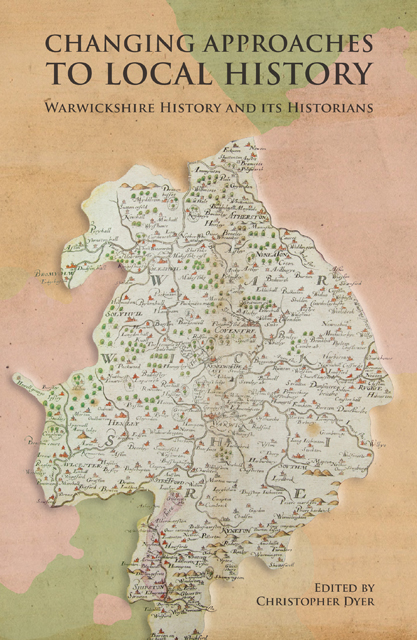Book contents
- Frontmatter
- Contents
- List of Illustrations
- Notes on Contributors
- Foreword
- Acknowledgements
- List of Abbreviations
- Introduction
- 1 The Dugdale Society: Its First Hundred Years
- 2 The Beginnings of Coventry
- 3 Was Commerce in Late Medieval Coventry Restricted by Regulation?
- 4 Studying Late Medieval Small Towns in Warwickshire 1920–2020
- 5 Rural Warwickshire in the Middle Ages: Society and Landscape
- 6 Religion, Rebellion and Red Jackets: Changing Approaches to Society and Politics in Sixteenth-century Warwickshire
- 7 Social Networks, Intellectual Affinities and Communal Harmony in Post-Reformation Warwickshire
- 8 Discovering Warwickshire’s Vernacular Architecture
- 9 Local History and the English Civil War: A View from Warwickshire
- 10 Writing Histories of the Landed Elite in Georgian Warwickshire
- 11 The Victoria County History in Warwickshire
- 12 Writing Women into the Political History of Warwickshire
- 13 Shakespeare and the Warwickshire Landscape in the Age of the Tourist
- Conclusion
- Index
10 - Writing Histories of the Landed Elite in Georgian Warwickshire
Published online by Cambridge University Press: 17 December 2022
- Frontmatter
- Contents
- List of Illustrations
- Notes on Contributors
- Foreword
- Acknowledgements
- List of Abbreviations
- Introduction
- 1 The Dugdale Society: Its First Hundred Years
- 2 The Beginnings of Coventry
- 3 Was Commerce in Late Medieval Coventry Restricted by Regulation?
- 4 Studying Late Medieval Small Towns in Warwickshire 1920–2020
- 5 Rural Warwickshire in the Middle Ages: Society and Landscape
- 6 Religion, Rebellion and Red Jackets: Changing Approaches to Society and Politics in Sixteenth-century Warwickshire
- 7 Social Networks, Intellectual Affinities and Communal Harmony in Post-Reformation Warwickshire
- 8 Discovering Warwickshire’s Vernacular Architecture
- 9 Local History and the English Civil War: A View from Warwickshire
- 10 Writing Histories of the Landed Elite in Georgian Warwickshire
- 11 The Victoria County History in Warwickshire
- 12 Writing Women into the Political History of Warwickshire
- 13 Shakespeare and the Warwickshire Landscape in the Age of the Tourist
- Conclusion
- Index
Summary
Modern historical interest in the landed elite draws on a number of different traditions, stretching back over the last century. Perhaps the oldest of these is Lewis Namier’s work on the political history of the late eighteenth century, on which he worked in the 1920s and 1930s – the early years of the Dugdale Society. Namier took a prosopographical approach, tracing the shared connections of MPs and concluding that it was local interests and personal priorities which were critical in their voting behaviour and in the operation of politics more generally. His interest and approach fed through into studies in the 1960s by F. M. L. Thompson and Gordon Mingay, and more recently by John Beckett. These widened the focus to incorporate social and cultural dimensions, but remained concerned with the elite as a collective group with a clear and coherent identity. This notion of identity and definition was the specific focus of Lawrence Stone’s investigation into the openness – or otherwise – of the elite. All these studies linked social status and the economics of estate management to political power. A great estate brought with it considerable influence over the electorate, and thus the choice of MPs. David Cannadine has explored the political power of the aristocracy, often focusing on their adaptation to the growing urban context. Alongside these studies was another strand of research, emerging in the post-war years and growing in significance through to the 1980s, which took a more economic approach and focused on the balance sheet of income and expenditure, for which account books were major sources. In addition to these financial records, historians such as Sir John Habakkuk have explored the use of marriage and estate settlements, mortgages and credit in developing and sustaining elite estates. Such research has greatly enriched our understanding of the functioning of landed estates and the legal-structural factors that underpinned the continuity in status of early modern landed elites, land as a source of income being overlain by its significance as the basis of political power. At the heart of the estate sat the country house, studied by successive generations of art historians as the acme of British architecture during this period. John Summerson, John Harris and others have taken a linear approach to the stylistic development in country house architecture and have read the country house as a symbol of elite tastes, preferences and allegiances.
- Type
- Chapter
- Information
- Publisher: Boydell & BrewerPrint publication year: 2022



